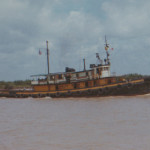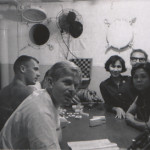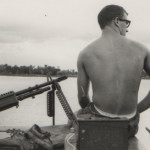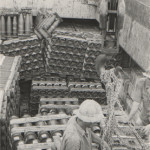The major part of anyone’s life story is their transition into adulthood and the coalescence of ideas and opinions that bring a mature personality to the fore. The most significant event shaping many lives of my generation was the Vietnam War. Through twists of fate, for seven months I worked in Vietnam as a civilian employed by a Pacific Northwest tugboat company, Alaska Barge and Transport, which was under contract to the US. military to move supplies around the country. Much of the transportation of materials around Vietnam was by barge. The US. military did not have a large fleet of tugs and barges and contracted with A. B. & T.
At the end of my sophomore year, my father was flying sensitive military cargo to Vietnam, for Pan American Airways. He suggested that I look for a summer job in Vietnam. Without knowing my father, it might seem hard to believe that he would
suggest summer employment in a war zone. For myself, still young and politically naive, the ethical questions of profiteering from the war, did not arise. My father, a product of the depression, World War II, and the Eisenhower boom economy, was a right wing conservative Republican, and having been spoon-fed his philosophy from an early age, I accepted it uncritically. How dramatically this was to change in the ensuing years.
The Vietnam War, raging full blast in 1967, was still unfamiliar to much of the US. public. A wide spread awareness of the full horror of the conflict and the violent antiwar protests of the sixties, were still in the future. My political sophistication was
practically non-existent and coupled with the cavalier, devil-may-care, attitude of a nineteen year old adolescent, raised in a small town, the idea of an adventuresome job in a global hotspot seemed quite romantic, patriotic, and exciting.
My father had an acquaintance who worked for Pan American in Saigon and arrangements were made for me to stay with him while I looked for work with one of the large US. companies supplying backup services for the war. My idea was that I might find work in construction trades.
I flew across the Pacific within days of finishing classes at Stanford, arriving in Saigon, in early June of nineteen-sixty seven. When the door ofthe airliner was thrown open to the tarmac of the Saigon airport, the heat was as if an oven door had bee!1
opened. Having grown up exclusively in the cool Pacific Northwest, I was unaccustomed to hot weather and it was difficult to adjust. Nevertheless, I proceeded over the next weeks to scour Saigon in search of employment. This was not easily done, since the city was in confusion and chaos over the escalating war. It was not as if you could look up a telephone number in the local Saigon directory. After asking around for about a week, I was eventually able to track down the offices of Alaska Barge and Transport. Posted prominently on the entrance door was a sign reading, “not hiring”. I was undeterred. The previous summer I had worked ajob on a Washington State Fisheries boat and having grown up around boats, I was somewhat experienced. For a person to present themselves at the office, having flown across the Pacific on their own, was unheard of, so I was a unique individual for them to consider. As fate would have it, due to a recent injury, the company had need of a deckhand (“ordinary seaman” or simply “ordinary”) on one of their tugs and I was hired on the spot and told to report on the docks the next day to find my boat, the M.Y. “Santiam”.
Most of the tugboat traffic was up and down the Saigon River, from the coastal river delta port of Vung Tau and up and down the Mekong River. Some of the larger tugs also made runs up and down the coast, mostly to Cam Rahn Bay. The main base of
operations was Vung Tau at the mouth of the Saigon River. Vung Tau had at one time been the horne to many of the rich French colonialists and was a sort of French Riviera of southeast Asia. There were lovely white sand beaches that stretched for miles along the South China Sea and many old colonial mansions spotted the overlooking hillsides.
Vung Tau was typical of much of Vietnam, in that it was beautiful countryside, populated primarily by peaceful peasants working the land as they had for probably thousands of years. But this rural tranquility had fallen under the horrible cloud of war, and it was easy to see evidence of the ruin of what had been. Vung Tau itself was an incountry military “Rest and Rehabilitation” or “RR” center, and, consequently, it was a modern day Gomorrah with door to door bars, open drug trade, and rampant prostitution. This was quite an eye-opener to a nineteen year old hick from Tacoma and I openly indulged myself in  pleasures offered from every avenue, unencumbered by conscience. I was a green, wild-eyed kid and my excesses later carne back to haunt my soul. Most of the sailors on the tugs were hard soldiers of fortune, all many years older. These men talked of little but money and pleasure and travelled the world looking for fast profit in trouble spots or boom-bust situations. It was a strange education for one as young as 1. A sad truth is that others my age were dying in the surrounding jungles in senseless war. The reality of what I was involved in dawned on me slowly over the months and years. It was an adjustment adopting to life on the boat. And this adjustment sent ripples forward throughout my life. As was typical in the maritime world, the twentyfour hour day was broken into six “watches” of four hours each. Each crew member with the exception of the cook and his helper, were assigned two four hour watches, one of which was daylight duty, the other nighttime. In addition the crew was called out any time, day or night, to rig up to barges, or to dock, or to drop barges.
pleasures offered from every avenue, unencumbered by conscience. I was a green, wild-eyed kid and my excesses later carne back to haunt my soul. Most of the sailors on the tugs were hard soldiers of fortune, all many years older. These men talked of little but money and pleasure and travelled the world looking for fast profit in trouble spots or boom-bust situations. It was a strange education for one as young as 1. A sad truth is that others my age were dying in the surrounding jungles in senseless war. The reality of what I was involved in dawned on me slowly over the months and years. It was an adjustment adopting to life on the boat. And this adjustment sent ripples forward throughout my life. As was typical in the maritime world, the twentyfour hour day was broken into six “watches” of four hours each. Each crew member with the exception of the cook and his helper, were assigned two four hour watches, one of which was daylight duty, the other nighttime. In addition the crew was called out any time, day or night, to rig up to barges, or to dock, or to drop barges.
 The daylight portion of the watch normally involved maintenance or cleaning, often chipping and scraping rust from metal surfaces and repainting. These chores were never ending and typically continue through the life of a vessel. The nighttime hours usually involved simply sitting in the wheelhouse listening for any incoming radio communication. These nocturnal hours were contemplative and peaceful, the cool of night offering pleasant air and quiet. Few lights interrupted the rural countryside and the stars were arrayed in full glory. It dawned on me how rare it is to find real quiet in the urban surroundings from whence I’d corne. I became addicted to the peace and quiet discovered in this faraway land and I would, henceforth, in my life, seek out rural areas to live.
The daylight portion of the watch normally involved maintenance or cleaning, often chipping and scraping rust from metal surfaces and repainting. These chores were never ending and typically continue through the life of a vessel. The nighttime hours usually involved simply sitting in the wheelhouse listening for any incoming radio communication. These nocturnal hours were contemplative and peaceful, the cool of night offering pleasant air and quiet. Few lights interrupted the rural countryside and the stars were arrayed in full glory. It dawned on me how rare it is to find real quiet in the urban surroundings from whence I’d corne. I became addicted to the peace and quiet discovered in this faraway land and I would, henceforth, in my life, seek out rural areas to live.
 The barges themselves, some several hundred feet in length, were loaded with every imaginable cargo. We would haul barge loads of bombs upriver and barge loads of blown-up equipment back down. Sometimes we would haul entire barges loaded with nothing but beer. The cost of warfare was graphically evident in the movement of materials, and absolutely staggering in its expanse. It was clear that unimaginable fortunes were being made by those supplying the war. Without witnessing the extent of the waste firsthand, one could scarcely conceive the insane sacrifice of human resources to the juggernaut of imperialism. I had been previously blind to the concept of a military-industrial complex driven by the wheels of greed. Another eye-opening experience, was the discrepancy between what one saw firsthand and what one read in the mainstream mouthpieces of that same military-industrial complex, most notably “Time” and “Newsweek” magazines. Previously, I had naively accepted these writings at face value, without question of truth or political slant. I would never again make this same mistake. The education I was receiving was not available at Stanford. The manipulation of the opinions of a culture by the dominant media, became a lifelong focus from those days on.
The barges themselves, some several hundred feet in length, were loaded with every imaginable cargo. We would haul barge loads of bombs upriver and barge loads of blown-up equipment back down. Sometimes we would haul entire barges loaded with nothing but beer. The cost of warfare was graphically evident in the movement of materials, and absolutely staggering in its expanse. It was clear that unimaginable fortunes were being made by those supplying the war. Without witnessing the extent of the waste firsthand, one could scarcely conceive the insane sacrifice of human resources to the juggernaut of imperialism. I had been previously blind to the concept of a military-industrial complex driven by the wheels of greed. Another eye-opening experience, was the discrepancy between what one saw firsthand and what one read in the mainstream mouthpieces of that same military-industrial complex, most notably “Time” and “Newsweek” magazines. Previously, I had naively accepted these writings at face value, without question of truth or political slant. I would never again make this same mistake. The education I was receiving was not available at Stanford. The manipulation of the opinions of a culture by the dominant media, became a lifelong focus from those days on.
The boat traveled with three or four soldiers aboard at all times and they brought with them an array of weapons, including machine guns, grenade launchers, and the omnipresent M-16 rifle. Most of these soldiers were little older than myself and the long slow hours and days on the river afforded much time for dialogue. It was primarily through these GI’s that I learned of the tragically misconceived nature of the Vietnam War. Their personal stories of death, futility, and heroism, were to stick with me forever. We saw military conflict on nearly a daily basis, in the form of napalm attacks and armed helicopter-gunship encounters, in the vicinity of the river. Although I had heard of attacks against other tugs, our boat was never fired on while I was on board. This is with the exception of a single round that I believe whistled past me, in the nighttime air, while at anchor near Vin Long on the Mekong River. It was one of those events, that happens sometimes in a lifetime, in which one is never sure of one’s exact perception. I was alone on watch, walking the deck, and the event was instantaneous, then gone, calling one’s senses into a judgment that can never be clear. It was perfectly clear, however, that shortly after I returned stateside in December 1967, that my boat was hit by rocket fire, during the infamous Tet Offensive and several of my shipmates were killed.
In light of these descriptions of war, it may seem paradoxical that an entirely different life experience was also revealed to me in Vietnam. In spite of the war, the land and people were of a slow peaceful nature that I had never known. My eight hours on watch during the day, left sixteen more hours with no demands and few diversions other than reading, writing, conversation and contemplation. It is not hard to understand the allure that the sea has always held for sailors. For the first months on the boat, I found myself restless, so used to a much more speeded up lifestyle, had I become accustomed in daily U.S.A. modem life. Few people can truly sense the frenetic pace that surrounds them daily, unless they are also exposed to the opposite extreme of tranquility. Life on the tugboat, despite the war, was characterized by this very excess of tranquility. Time moved slowly and contemplatively, and after several months I vowed to never return again to the speed at which I had previously spent the days of my life. The languid peace of the tropics and of time lived on the riverboat were seductive and sweet. Days seamlessly flowed into weeks and weeks to months. While in Vietnam, though I made a vow to forever hold on to the virtues of this pace of life, I subsequently was to discover, on my return to the “first world”, how difficult it is to maintain a life pace different from the culture in which one is immersed. It was likely the zealous passion with which I pursued this vow, that led to the nightmare of psychological breakdown which followed my return to the U. S.
Though still a teenager, I had maintained a passionate relationship with my highschool girlfriend for more than three years, and I pined away for her company. My longing for her drove me to the towns and cities which offered up the decadence
characteristically accompanying the dogs of war, and to which sailors returning from the sea have forever been drawn. How different from my staid, middle class upbringing were the pleasures that I now drunk unashamed to the dregs.
I read voraciously during my leisure on board the tug. I devoured history, literature, and philosophy, and spent hours writing and growing into a new human being, stretching the boundaries of my mind. Like many of my generation I discovered the strange powers, gifts, and illusions of marijuana, which was as cheap and plentiful as other available pleasures, yet my intellectual probing and enquiring nature set me apart from my rougher shipmates, who, nonetheless, became brothers of sorts. There was an undeniable parallel with the reality described in Joseph Conrad’s classic “Heart of Darkness”, and, indeed, that metaphor still describes most succinctly my memories of that strange time and place.